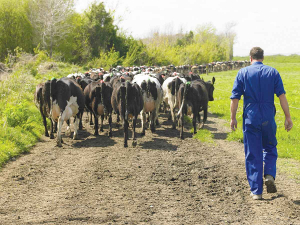Waikato dairy effluent breaches lead to $108,000 in fines
Two farmers and two farming companies were recently convicted and fined a total of $108,000 for environmental offending.
 Waikato Regional Council says planning is necessary when it comes to preventing pest plant spread and ensuring effluent doesn’t enter waterways.
Waikato Regional Council says planning is necessary when it comes to preventing pest plant spread and ensuring effluent doesn’t enter waterways.
Waikato Regional Council is reminding farmers to ensure machinery, vehicles and equipment are cleaned ahead of Moving Day.
The Council says planning is necessary when if comes to preventing pest plant spread and ensuring effluent doesn’t enter waterways.
“Through good on-farm biosecurity practices, farmers and contractors can make a massive difference to preventing the spread of pest plants and weeds,” says regional council biosecurity pest plants team leader, Darion Embling.
“Unclean machinery is a confirmed pathway for the spread of infestations, such as velvetleaf and alligator weed, between some farms in our region. That makes machinery hygiene especially important with Moving Day coming up and the mass movement of stock, machines and vehicles between farms.”
Embling says machinery hygiene must be practiced any time a machine is moved between properties.
“Any form of plant or soil contamination has a real potential for harbouring pests or weeds. Machinery should be cleaned so no visible soil or plant matter remains,” he says.
Ideally, machinery washdown should occur on the property prior to movement, containing any problems at the source. Alternatively, machinery can be cleaned in a built-for-purpose washdown facility, but care should be taken to ensure there is not a risk of pest spread during transport to that facility.
“Pest plants such as alligator weed and velvetleaf can have a massive impact on the productivity and profitability of farm businesses, so farmers and contractors need to be extra vigilant when moving between properties,” says Embling.
Farmers are also reminded to stand stock off green feed before they’re walked or transported to prevent effluent entering waterways and help keep the region’s roads clear of discharge and safe for users.
A cow’s daily combined effluent is approximately 52 litres, and a truck effluent tank’s capacity is just 200 litres. It means the spillage of effluent onto roads is a real risk unless farmers in particular take some simple steps ahead of time.
The regional council recommends that farmers:
use dry feed before transport because it results in less effluent.
The 5+ A Day Charitable Trust has launched a collection of affordable recipes designed to turn everyday vegetables into seasonal stars.
Jane Mellsopp has been confirmed as the new Government Appointee to the New Zealand Meat Board (NZMB).
To celebrate the tenth anniversary of its annual Good Deeds competition, Rabobank will give away $100,000 to improve rural community hubs, schools, clubrooms, and marae across New Zealand.
Agricultural and veterinary product supplier Shoof International has appointed Michaela Dumper as its new chief executive.
Federated Farmers is celebrating following the Government's announcement that young farmers will be able to use their KiwiSaver funds to buy their first home or farm.
The Meat Industry Association of New Zealand (MIA) today announced that Chief Executive Officer Sirma Karapeeva has resigned from the role.